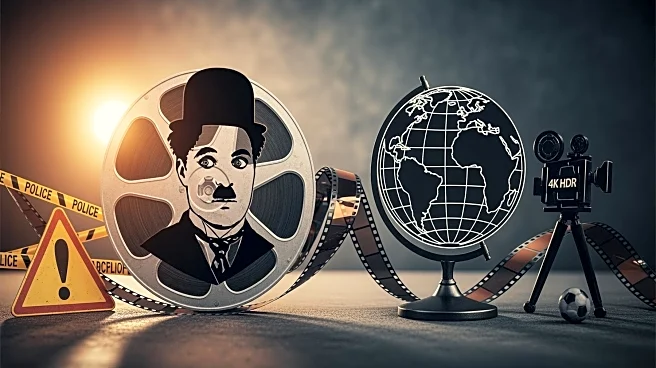What's Happening?
Charlie Chaplin's film 'The Great Dictator,' released in 1940, was a bold satirical attack on fascism, using Chaplin's resemblance to Adolf Hitler to parody the Nazi leader. Despite initial resistance
from Hollywood studios due to the U.S.'s diplomatic relations with Nazi Germany at the time, Chaplin financed the film himself. The movie features Chaplin in dual roles: as Adenoid Hynkel, a parody of Hitler, and a Jewish barber mistaken for Hynkel. The film culminates in a powerful speech advocating for peace and humanity, marking Chaplin's first spoken role on screen. The film stirred controversy, drawing criticism from figures like Sen. Joe McCarthy and J. Edgar Hoover, who accused Chaplin of Communist sympathies, leading to an extensive FBI file on him.
Why It's Important?
The release of 'The Great Dictator' was significant as it used comedy to critique and challenge totalitarian regimes, a method praised by figures like Ray Bradbury. Chaplin's film highlighted the power of art in political discourse, encouraging audiences to reflect on the dangers of fascism and the importance of democracy and human kindness. The film's impact extended beyond entertainment, influencing public opinion during a time when the world was on the brink of war. Chaplin's message of unity and peace resonated deeply, showcasing the role of cinema in shaping societal values and political thought.
What's Next?
While 'The Great Dictator' was released before the full extent of Nazi atrocities was known, its legacy continues to be relevant in discussions about the role of art in political activism. The film remains a poignant reminder of the power of satire and the importance of standing against tyranny. As global political landscapes evolve, the themes of Chaplin's work continue to inspire filmmakers and activists to use their platforms for social change and to challenge oppressive systems.
Beyond the Headlines
Chaplin's film not only challenged fascism but also highlighted the ethical responsibilities of artists in times of political unrest. The controversy surrounding Chaplin's alleged Communist sympathies and the subsequent FBI investigation reflect broader issues of censorship and political persecution in the U.S. during the mid-20th century. The film's enduring relevance underscores the ongoing struggle for freedom of expression and the role of art in advocating for human rights and social justice.










